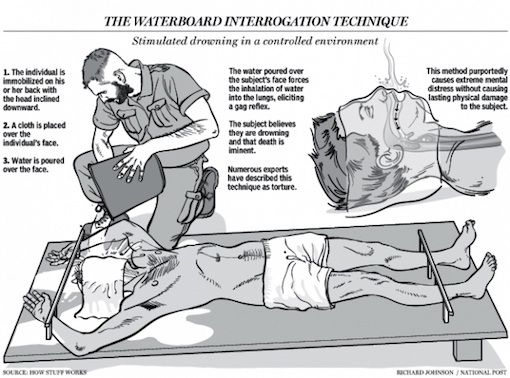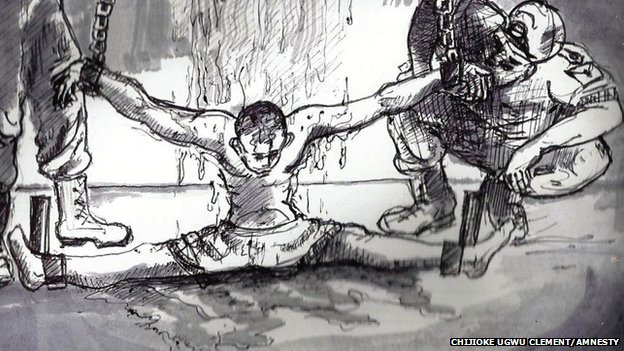First, let me thank you Molly, Maddi, Matt, Megan, Olivia, Lyons and Sydney, Sean, Vincent, Victoria, Brandy and Bobby, Abby, Alicia, Amy and Cole, Kalie and Tyler for taking the time to thoughtfully respond to the issue of torture.
I will answer your observations by reacting to sentences from your remarks. I apologize that I am unable, one by one, to give you individual replies.
Quotations 1 to 7:
“Some torture is ok.”
If we stop torturing, then our country will look weak. Even though torture is done by Americans, it is not done inside the US so I believe that’s more acceptable.”
“But where are the tortuous tactics that our enemies use?”
I believe the use of torture is necessary only when it is truly needed.”
Since the attack on the Twin Towers, the US simply has the right to interrogate suspected terrorists however they please.”
Torture is simply business.”
I believe in torture as an absolute last resort.”
 Let me pose some questions for you to consider:
Let me pose some questions for you to consider:
If the United States uses torture to collect information from individuals we suspect are terrorists, who should decide this? At what level of government? Should we as citizens have any say in this decision?
Now, assume this to be true, that somehow, somewhere, the decision is made to use torture once again.
What tactics and methods are acceptable? May we pull teeth? May we beat a man with a baton, a pipe, a piece of hose, a pool cue, a bare fist? May we do this to a woman? On Sunday ISIS released video showing children as young as five years old being trained for jihad. Are they too our enemies? May we torture a child?
May we threaten to rape a man’s wife, mother, children? May we threaten to murder them? Having already used rape as a method of torture on men, may we now use it on women? On children?
How do you feel even reading or listening to those purely factual questions?
Should torture be governed by law? Should the American people be told of this policy right from the beginning? Do we have a right to know what is being done in our name? Theoretically, should a statement be issued by the President stating that beginning on March 1, we will torture the enemies of the United States to protect our people. We will use any tactics we deem necessary against terrorists including rape, waterboarding, stress positions, beatings, freezing temperatures, drugs, deafening music, sleeplessness and if necessary, murder. We will use these methods against men, women and children, the young and the old.”
How would you react to such a statement? How would our allies react?
Now again, assume that torture begins.
How will we control it? Who will do it? Who will train them? How will we deal with each person after he or she has completed the allotted duty as a torturer — how will we integrate them back into our peaceful midst? How do you imagine they will have changed?
Should women be trained to torture?
Should only Muslims be tortured? Should American citizens be tortured? Should we bring them here to conduct the sessions? If not, why not?
How will the torturers know when they have succeeded?
What are we to do with those we have tortured once we are finished with them?
Because ISIS is so brutal and Bashar al-Assad’s men so vicious, are we to respond to our enemies’ savagery with our own?
If so, why? What will we gain?
How are we to measure our nation’s strength or weakness using torture as a standard? Are the killers of ISIS strong? Are they real men? Must we perfect methods of torture and pain that are more severe than theirs so that we can be regarded as the Alpha, the baddest badasses of all? For example, should we film terrorists being torn apart by wild animals? Should we starve them to death? Should we throw them into meat grinders? These are serious questions. What will make them fear us?
If we take these steps, what will happen to us as a people? What will we become? What do we stand to lose?
Quotation #8:
In war there is no moral high ground.”
 I agree. William F. Buckley said that “war is the second worst action human beings take, slavery being the worst.” Industrial war means mass death, mass destruction, civilians mixed in with combatants. Any honest historian or soldier knows this. In World War II, in Vietnam, in every war we have fought, Americans too have done terrible things, but we have not operated death camps, we have generally observed the rules of the Geneva Convention regarding prisoners-of-war, good officers and our free press have tried to bring abuses to light when they have occurred. We have often tried to make amends when we have done wrong. Americans also know that the blood and lives of our men and women defeated a slave nation that tried to split this country in half, saved Europe twice and defeated the arch-monster of the 20th century, defeated a tyrannical Empire that attacked us without warning at Pearl Harbor, and kept South Korea free of the worst dictatorship in the modern world. Thousands more died or were grievously wounded fighting Al Qaeda after the attacks of 9-11. Much of the blood we have shed has been sacrificial.
I agree. William F. Buckley said that “war is the second worst action human beings take, slavery being the worst.” Industrial war means mass death, mass destruction, civilians mixed in with combatants. Any honest historian or soldier knows this. In World War II, in Vietnam, in every war we have fought, Americans too have done terrible things, but we have not operated death camps, we have generally observed the rules of the Geneva Convention regarding prisoners-of-war, good officers and our free press have tried to bring abuses to light when they have occurred. We have often tried to make amends when we have done wrong. Americans also know that the blood and lives of our men and women defeated a slave nation that tried to split this country in half, saved Europe twice and defeated the arch-monster of the 20th century, defeated a tyrannical Empire that attacked us without warning at Pearl Harbor, and kept South Korea free of the worst dictatorship in the modern world. Thousands more died or were grievously wounded fighting Al Qaeda after the attacks of 9-11. Much of the blood we have shed has been sacrificial.
Why would we now want to destroy our best qualities as a nation by indulging in unrestrained murder and torture?
Quotations #9 and 10:
“I personally feel that Mr. Wall is one of those people who don’t want to give up any of their freedom but when something happens he will be the first to complain to the government and say “where were you and why didn’t you do anything to stop them. Mr. Wall please ask your self this, is one person worth hundreds or even millions of innocent people?”
Torture [should not control] us so that we do not become the monsters we fight against.”
This is a fair assertion and one that needs to be answered.
Americans have already given up a portion of their freedom. Whenever we text, send an e-mail, or speak on our phones, and whenever we log on to the internet, we must assume that the NSA is sweeping up our messages and storing them to compare against other indicators and thus decide if we match a terrorist profile. Whenever we fly, we have to remove our belts and shoes and undergo full body scans to determine if we are carrying weapons or a bomb. If you own a cell phone or travel via commercial airlines, you have made your peace with a loss of freedom.
That said, no I would not be willing to give up more freedoms. What would be the next to go — freedom of speech, the right to protest the government’s actions, a draconian Secrets law that keeps the government’s actions from us? What will we have won if we descend into dictatorship?
However, I remember how I felt when a vice-principal whispered to me that the Twin Towers were gone and the Pentagon was on fire. We had no internet in this school in 2001, no cell phones of course and only one television in the entire building capable of accessing minute by minute information. Each teacher broke the news to his or her classes that we had been attacked, that the World Trade Center had collapsed with thousands dead, that another airliner had been crashed into the Pentagon. At the center of my grief and uncertainty grew a furious core that wanted blood. I wanted vengeance. I wanted us to obliterate anyone connected to these acts. I wanted any nation who sponsored them to be made into rubble. And I would have been willing to pull the trigger, press the button, give the yes necessary for all that to happen.
But a desire for vengeance should not determine a nation’s policy. That must be done calmly, rationally, with forethought given to all the consequences of one’s actions. Vengeance is not ruled by law but by passion. I know how close to the surface our desire for blood runs, how very thin our civilized veneer can be, how susceptible to cruelty we can become. If we make decisions based on a desire to make others suffer, will we not have given into our worst impulses? Will we not have become “the monsters we fight?”
Quotation #11:
The people receiving these actions may not be innocent, but they are still humans.”
They are human beings. They are not creatures, zombies, or animals. If we regard them as less than us, as simpler than us, as unattached to human experience, we will refuse to see their complexity and that will lead to bad policy. The FBI has shown that a calm approach in interrogation produces more accurate information more quickly than torture. Plus there is this: make it personal: if you were being tortured, what would you do to make the pain stop? What would you say?
Quotation #12:
Some may argue it is only fair that we torture terrorists in [these ways] because they could be doing the same to us. I do not like to think of it that way, but I guess there is really nothing I can do about it.”
 Whether wielded by the left or the right, we must be skeptical of power, but not cynical or fatalistic. Cynicism is a cheap emotion. It encourages weakness. It is precisely what those who abuse power want from us. They want us to shrug our shoulders or make jokes about them and bury ourselves in our private lives.
Whether wielded by the left or the right, we must be skeptical of power, but not cynical or fatalistic. Cynicism is a cheap emotion. It encourages weakness. It is precisely what those who abuse power want from us. They want us to shrug our shoulders or make jokes about them and bury ourselves in our private lives.
We do not have to torture ever again. You can ask your representatives if they support its use. You can organize against them. You can vote out of office those who evade the question or answer yes. You have that power.
Finally, let me once more emphasize this most important idea: If you decide that torture is acceptable, would you be willing to do it?
Do not turn away from the question.
If you answer yes, then imagine the room where it will take place. Imagine you standing over a handcuffed prisoner. Imagine the tools on the table next to you. Imagine his screams and blood. Imagine what becomes of you once you leave that room.
*Andrew is a friend, a teacher from a local high school, who asked his students to respond to my essays on torture. I promised that I would do so.
I agree, Mr. Wall. Torture is as morally reprehensible as it is utterly useless. Its only utility is to cause misery. The Romans used torture as a matter of course, and even in those brutal times they acknowledged that torture was a great way of getting someone to admit to anything (not a reliable means of getting the truth).
When I first heard that our government practiced “enhanced interrogation techniques” I was embarrassed that our nation did something so horrible. When politicians tried to argue that these techniques were not torture, I was outraged.
Thanks Mike. I appreciate your reasoned and balanced responses to the sickening (mis)direction our country has taken. I like the fact that you can express your emotions (wish for vengeance, blood) and then calmly take a step back, count to 10, and get the bigger picture into focus. I wish more people, especially those in power, had such restraint …